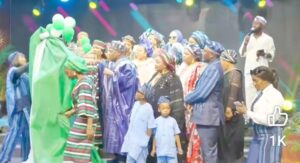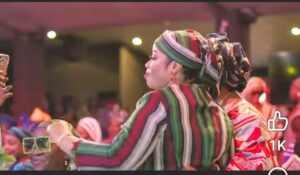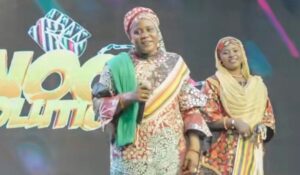

By Dada Ahmed.

(C) Facebook/Khalifa Abdulrahman.
The event, now in its fourth edition, has become more than a celebration of fashion, it is a resounding statement of cultural revival, unity, and continuity among one of Nigeria’s most dynamic ethnic groups.
According to the Ohinoyi of Egbiraland,Dr. Ahmed Tijani Mohammed Anaje, Egbira as a tribe now occupies 7th position among the major tribes in Nigeria. He stated this in his palace in Okene when he received in audience, the executive members of Kogi Central Think Tank Forum who paid him a courtesy visit.

(C) Facebook/Khalifa Abdulrahman
At the heart of the festival is the famed Ita-Ini Oguntoro, the centuries-old Egbira handwoven fabric that has become both a fashion statement and a cultural symbol. Once worn mainly by elders and traditional title holders, the fabric is now being reimagined by young designers and models who showcase it with modern twists. This fusion of old and new was the central attraction of the festival, reminding everyone that culture thrives when it adapts rather than when it resists change.

The event also featured Apapa,a special delicacy in Egbiraland.
(C) Facebook/Khalifa Abdulrahman.
Beyond fashion, the festival served as a rallying point for the Egbira creative community, musicians, poets, dancers, artisans, and filmmakers and apapa,a special Egbira delicacy to eat.This was in addition to performances that celebrated Egbira proverbs, traditional songs, and folklore which brought the people together in shared nostalgia and pride. The laughter, the chants, and the drumbeats that characterized the convivial atmosphere at the event all told one story: that culture is best preserved when it is lived and celebrated collectively.

() Facebook/MC Lawal.
For many participants, such as Mal. Mohammed Umoru,the event was a homecoming of sorts. “Itinochi is not just a show, it is a cherished experience for Egbira race. It is our way of saying we are proud of who we are, and we want our children to know the beauty of being Egbira,” he said.His words captured the deeper mission of the festival,transmitting values, artistry, and identity across generations in a rapidly changing world.
The Egbira people have long been known for their industriousness and creativity. History reveals that from iron smelting in precolonial times to intricate weaving and dyeing traditions, craftsmanship has always been central to the Egbira economy and culture.

(C) Facebook/Khalifa Abdulrahman.
The Itinochi Revolution builds on that legacy, turning traditional skills into platforms for economic empowerment making it possible for young designers now to see in Egbira fashion not just culture, but business, an opportunity to create, brand, and sell proudly local designs to national and international audiences.

(C) Facebook/Khalifa Abdulrahman
Equally important, the festival has given visibility to Egbira cultural expressions long overshadowed by Nigeria’s mainstream cultural centres. In a multicultural country where dominant narratives often drown out smaller ethnic voices, Itinochi Revolution gives the Egbira people a voice, a chance to tell their own stories, on their own terms, through art, dress, and performance.
The social impact of the event cannot be overstated. It rekindles unity among Egbira communities scattered across the country and in the diaspora. Many attendees travelled from Lokoja, Okene, Osara, Ihima,Ogaminana, Okengwe Kuroko among others,and even outside Nigeria to witness the display of culture. That shared experience has helped foster stronger bonds, bridging generational and geographical divides that once threatened to erode communal cohesion.
Moreover, the festival reinforces cultural education. Through its exhibitions and performances, young people learned about the meaning behind traditional motifs, the process of cloth weaving, and the significance of ancestral songs. For many Egbira youths born in cities, the festival provided their first real contact with the authentic cultural experience of their forebears.
There’s also an undeniable tourism dimension to the colourful event. Culture enthusiasts such as Adai Sani Ahmadu believe that by hosting the festival in Abuja, a cosmopolitan hub,the organizers have positioned the Egbira culture on a national stage. Many visitors and media personalities from across the country who graced the occasion confessed witnessing firsthand, the artistic wealth of the Egbira people. Such exposure, if sustained, they urged,could attract investment into cultural tourism, craft production, and creative industries in Egbiraland.
Culturally, the Itinochi Revolution serves as a counter-narrative to the erosion of indigenous identity. In a time when Western fashion dominates and local textiles face extinction, the festival reasserts the dignity of local fabrics. It tells a younger generation that pride in one’s heritage is not backwardness, it is an authentic belief
The festival also serves as a subtle tool of diplomacy and cultural advocacy. By projecting positive images of Egbira people as creative, peace-loving, and industrious, it challenges stereotypes and promotes social harmony in Nigeria’s diverse society. Culture, after all, is not just art, it is soft power, and Itinochi Revolution wields it gracefully.
As dusk fell on the festival grounds, attendees described their experience at the scene as unforgettable, adding that it served as light illuminating colourful Egbira garments. They also cherished women adorned in handwoven wrappers, and men in intricately embroidered tunics, dancing to native rhythms. To many that witnessed the event, it was a living museum of heritage, a reminder that modernity and tradition can indeed coexist beautifully.
When all is said and done, it must be stressed that Itinochi Revolution represents an apt experience which stands as both a celebration and a declaration that the Egbira culture will not fade into history’s shadows. With every drumbeat and every woven thread, the Egbiras have reaffirmed their collective identity, resilience, and pride.
The event, therefore, is not merely a cultural gathering but a revolution of memory, creativity, and continuity,one capable of elevating the rich culture and traditions of Egbiraland to greater heights beyond the shores of Nigeria.
Ahmed,a historian, journalist,publishes The Reporters.
ahmeddada008@gmail.com.

